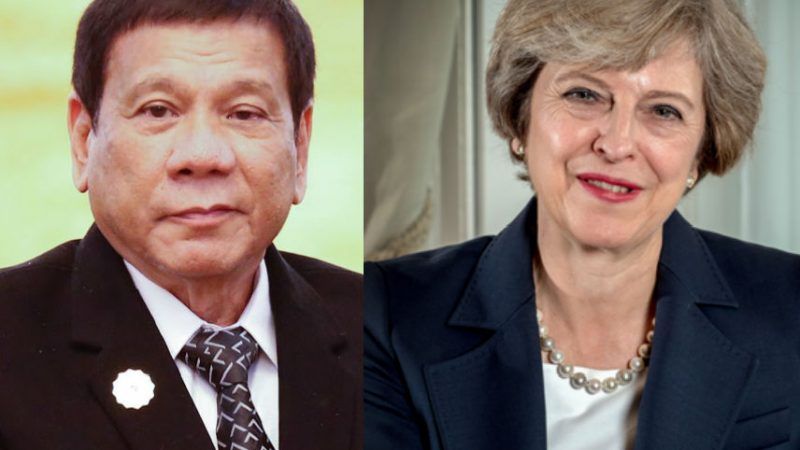Theresa May and Rodrigo Duterte Both Find 'Human Rights' Annoyingly Inconvenient
Security threats don't excuse the abolition of due process.

Here's U.K. Prime Minister Theresa May, one of the world's most respected leaders, talking about what she will to do to keep her country safe:
I'm clear: if human rights laws get in the way of tackling extremism and terrorism, we will change those laws to keep British people safe. pic.twitter.com/8EfUJYUDMK
— Theresa May (@theresa_may) June 6, 2017
And here's Philippine President Rodrigo Duterte, one of the world's least respected leaders, talking about what he will do to keep his country safe:
"My mouth has no due process,'' Duterte said in a nationally televised speech on August 7th…Duterte has warned drug peddlers to surrender themselves or face summary execution. "My order is shoot to kill you," he said on August 6th. "I don't care about human rights, you'd better believe me."
There are, of course, huge differences between May's approach to anti-terror measures and Duterte's approach to the war on drugs. Let me say that one more time for the kids in the back: I am not claiming direct moral equivalence between Rodrigo Duterte and Theresa May. I am, however, noting a troubling similarity between their approaches to one important matter.
May is proposing using existing legal mechanisms to "derogate" or depart from the parts of the European Convention on Human Rights which prohibit arbitrary detention of individuals by the state. This requires a declaration of a state of emergency, martial law, or some other action that indicates the "life of the nation" is threatened. She is likely considering such a move.
By contrast, Duterte's legal theory seems to be "Fuck it, I do what I want." He is likely going to do whatever the hell he wants.
(In case you're wondering how Duterte handles Islamic terrorism, here's a hint from today's news: "When I say crush them, you have to destroy everything including lives.")
But here's where they both end up: Human rights and due process are all well and good until they get in the way of something politicians or law enforcement deem a priority, at which point they become negotiable.
And that argument is troublingly familiar: For a domestic example, recall the "No Fly, No Buy" bill pushed by Democrats (and backed by Donald Trump), which was yet another proposal to deny basic rights to people simply for being under suspicion of affiliation to terror.
In her remarks immediately after the attacks, May clearly already had this particular infringement of due process on her wishlist, saying, "if we need to increase the length of custodial sentences for terrorist-related offences—even apparently less serious offences—that is what we will do." (Note that May increasingly lumps terrorism, typically used to described violent actions, in with extremism, a much broader term which can refer to systems of beliefs.)
It is now a standard part of political posturing to signal seriousness about security by indicating that you are willing to violate human rights, as commonly understood by the community of nations. This is not going to end well.


Show Comments (35)